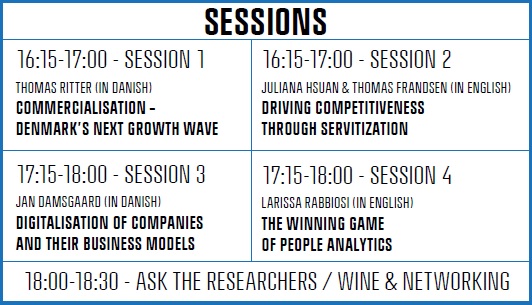Four Drivers for Competitiveness
As a prelude to the large science festival, Forskningens Døgn (Festival of Research), CBS Competitiveness Platform invites you to four presentations. The focal point is growth through increased competitiveness. Five CBS researchers will present four suggestions on how to reach the next growth waves through commercialisation, servitization, digitalisation and Human Capital Analytics.
The event, “Four Drivers for Competitiveness”, will be held on Wednesday, 22 April, 16:00-18:30 at Copenhagen Business School, Kilen, in rooms 48 and 54. The presentations take place in parallel, so you have to choose two out of the four presentations to attend. However, at 18:00 after the presentations, there will be an opportunity to talk with all the researchers and the other participants over a glass of wine.
Program

SESSION 1: COMMERCIALISATION – DENMARK’S NEXT GROWTH WAVE
By Thomas Ritter – researcher in commercialisation (presentation is in Danish)
After strong improvements in purchasing and production functions, for example through outsourcing and lean, the focus of the growth agenda is now moving towards corporate commercialisation. This presentation explains the elements of commercialisation, demonstrates its effect, and discusses Danish companies' efforts to exploit this growth opportunity.
Takeaways:
- A tool to analyse companies' commercialisation
- A framework for building profitable business models
- Insight into the next growth wave
SESSION 2: DRIVING COMPETITIVENESS THROUGH SERVITIZATION
By Juliana Hsuan & Thomas Frandsen – researchers in servitization
In collaboration with The Danish Industry Foundation and Danish companies, CBS is researching on how servitization can be a strategy to enhance the competitiveness of manufacturing firms. Servitization, or adding services to the manufactured product, has become a strategy for increasing financial margins, getting closer to the customer and prolonging product lives. This is especially applicable to Western hemisphere companies in their efforts to compete with companies from low cost countries and emerging economies.
Takeaways:
- How servitization can be a decisive performance factor and hence drive competitiveness
- How servitization can help Danish firms to compete in the global markets by increasing the value of their solutions
- Inspiration on tools for analyzing and planning a servitization strategy
SESSION 3: DIGITALISATION OF COMPANIES AND THEIR BUSINESS MODELS
By Jan Damsgaard – researcher in digitalisation (presentation is in Danish)
Companies and their business models are gradually becoming more digitalised, which means that the competitive advantage has shifted from having the best products to offering the best digital services on the most popular digital platforms. This presentation focuses, in particular, on the digital transformation of the financial sector. As an example, the digitalisation of payment services is described.
Takeaways:
- Why technological paradigm shifts often lead to a radical transformation of dominant companies
- How profitable digital platforms are built around several types of users, and some pay for what others get for free (e.g. Google's search engine)
- A discussion of the duel between MobilePay and Swipp, and the looming international players - who should pay for the payments?
SESSION 4: THE WINNING GAME OF PEOPLE ANALYTICS
By Larissa Rabbiosi, researcher in Human Capital Analytics
Companies accumulate a surfeit of workforce data over the years: employee demographics, employees’ engagement surveys, customer satisfaction data and other business KPI such as productivity, performance, sales, etc. Yet, only few HR practitioners make extensive use of company data to drive human capital management decisions. Why so? Drawing upon experiences from working with large Danish and European companies, we discuss the top three reasons for why managers make their decisions still relying on own gut feeling instead of the evidence.
Takeaways:
- How to identify the right data
- How to find the people you need, with the advanced analytical skills and scientific rigor in modeling
- How to develop the capabilities to interpret and apply the results of HR analytics